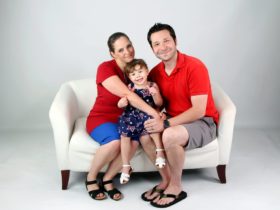Your cart is currently empty!

Guest Article: A Loved One’s Perspective on Mental Illness

A Guest Article by Debra Wyatt
My name is Debra Wyatt. I am a thirty-five year old mother to a toddler, wife to an amazing man, and I work full-time. I grew up with two older brothers, which made me the baby and little sister. My oldest brother and I are 6 years apart and we have had a special bond since I was little, his name was my first word. You are probably familiar with him, as this is being published on his blog: Gabe Howard.
All that being said, I was unaware of what he dealt with at school or work, or with his mental health. I remember when he left to live with our grandma and grandpa in another state, but I didn’t know why. Our parents have always had the tendency to withhold any information that is unpleasant or might make someone sad. I just knew he moved, was going to finish high school there, and that he never moved back home.
In my junior year of high school, my dad was transferred from Ohio to Tennessee, which led to my decision to join the Army upon graduation. My first duty station was Germany, followed by Ft. Hood, Texas, and I deployed a total of four times. My communication with my family was pretty much just phone calls and letters, since this was the pre-social media era.
Looking Back Before His Mental Illness Diagnosis
 Looking back, I don’t know that they ever filled me in on what was going on in my brother’s life. Like I said before, my parents have always refrained from passing on any news that is not happy-go-lucky and downplayed anything serious if they are forced to divulge such information. Therefore, I was, in every sense of the word, completely ignorant. Please understand that I use the term ignorant in its simplest form: lack of knowledge, education, or awareness about something in particular.
Looking back, I don’t know that they ever filled me in on what was going on in my brother’s life. Like I said before, my parents have always refrained from passing on any news that is not happy-go-lucky and downplayed anything serious if they are forced to divulge such information. Therefore, I was, in every sense of the word, completely ignorant. Please understand that I use the term ignorant in its simplest form: lack of knowledge, education, or awareness about something in particular.
When I did find out about Gabe’s diagnosis and how close he came to dying by suicide, I don’t think it truly registered (most likely downplayed by my well-meaning parents, as I really can’t pinpoint when I found out). I didn’t know what it meant and my understanding of mental illness was limited to what I saw on TV or read in a book (both entirely fiction). Gabe and I stayed in touch and he encouraged me to learn more about his diagnosis, but it was still just words on a page to me. I understood what I was reading, but since I personally never saw Gabe go through mania or depression, it didn’t really register. It wasn’t until Gabe started writing and sharing his experiences with mental illness that my eyes were opened. Don’t get me wrong. I have always supported and loved my brother. I just didn’t understand.
Recently, I became a part of the Facebook group: Positive Depression/Bipolar Happy Place. It’s a humbling experience, but I can’t really give people advice on how to cope with ups and downs of being bipolar because I don’t know what it’s like. I’ve been sad, but not depressed. I’ve ben really happy/excited, but I’m sure it is nowhere near the experience of being manic. Nor do I know what it is like to go from one extreme to the next. I try to offer my support where I can, but I don’t want to inadvertently offend someone. So, here is my advice as a loved one:
When a family member or friend says something out of line or offensive, please take a moment to see where it’s coming from. If they love and care about you, then it probably came from ignorance rather than malice. Use it as an opportunity to educate instead of replying with a quick, snide remark that might make you feel good, but doesn’t help them understand why what they said was inappropriate.
For example, I remember when I was an adolescent and I overheard my mom and Gabe discussing his acne. I had never heard the term before so I listened to the context of the conversation to figure out what they were talking about. When I finally understood, I asked (in all innocence) if that was the pimples on his face. I’ll never forget his quick reply of, “Are those pimples on your chest?”
I didn’t realize at the time that my question was hurtful, but the response hurt me and it took a long time before I understood what really went on during that conversation.
Now that my education on mental illness has been expanded beyond the world of make believe, I try to do my part to help reduce/eliminate the stigma associated with those who are mentally ill. Of course, there are the easy parts of contributing to fundraisers, buying supporting merchandise, and wearing/displaying said merchandise, but I also do my best to engage in those (sometimes) hard conversations. In my line of work, I teach an Emergency Medical Response class and there is a chapter that discusses behavioral emergencies. It’s a chapter that, in the past, I would have just run through the PowerPoints to be done with it, but now I spend a lot of time advocating and trying to eliminate the stigma. I even had the pleasure of working out an opportunity for Gabe to come talk to my class about mental illness (something that I would love to make happen again *hint-hint, Gabe*).
It. Is. All. About. Education. (When it comes to Mental Illness)
I know that I have said things about mental illness out of ignorance or misconception that has hurt or offended my brother, but now he takes the time to educate me, and for that I am grateful and I feel our relationship has only gotten stronger. If possible, I may even love him more today than yesterday. It is never my intent to hurt or offend someone; it’s just not in my nature. So, all I ask is that you take the time to explain and teach your friends and family members so they understand. In addition, let them know what they can do to help you, whether it’s offering a listening ear, a comforting shoulder, a text, a call, or even just giving you your space. In order to reduce/eliminate the stigma, we need to reduce/eliminate the ignorance. So, help and educate us so we can help and support you in your time of need.
Gabe’s Note: Thank you baby sister for you support and kind words. Muah!
